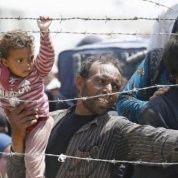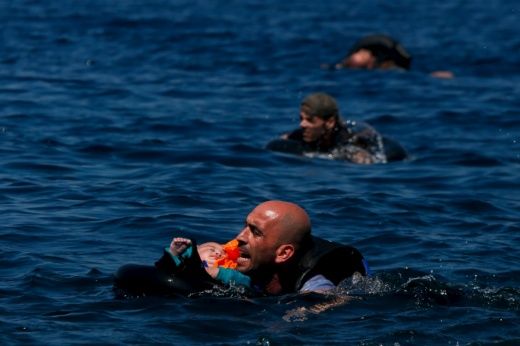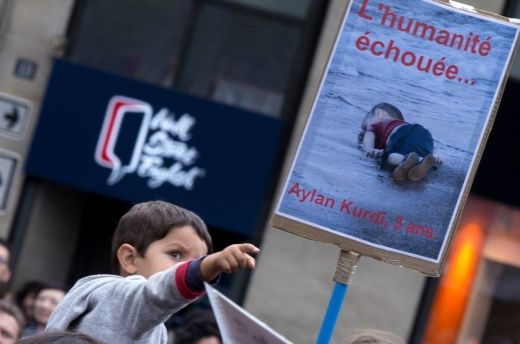Greece began shipping migrants from the island of Lesbos to Turkey on Monday under a controversial European Union deal aimed at stopping the flow of migrants and refugees into Europe.

Under the EU-Turkey deal, Ankara will take back all migrants and refugees, including Syrians who enter Greece illegally, in return for the EU taking in thousands of Syrian refugees directly from Turkey and rewarding it with more money, early visa-free travel and progress in its EU membership negotiations.
But the deal has rightly been labelled a travesty by human rights groups. Here's why:
1. Turkey Not a 'Safe Third Country'

A Syrian refugee tries to keep his children warm. | Photo: Reuters
In order for the deal to go into effect, the European Union and Greece approved a law labeling Turkey a “safe third country” for refugees. But reports ahead of the deal suggest authorities in the country are forcing those fleeing the conflict back into Syria, a violation of international human rights law.
PHOTO GALLERY:
Turkish troops have also reportedly shot and killed at least 16 Syrian refugees who attempted to cross the border, including women and children, the London-based Syrian Observatory for Human Rights said late March.
It is also worth noting that those fleeing to Europe are not only Syrians but also include people from other countries suffering war and conflict such as Afghanistan, Iraq and Somalia.
But Turkish law forbids Iraqis and Afghans from obtaining refugee status, which means if citizens of those countries are sent to Turkey they could be deported to their home countries, where they are likely to face persecution and possibly even death.
2. The Deal Violates Human Rights

Children sleep on a refugee woman's lap in Istanbul, Turkey. | Photo: Reuters
The U.N. refugee agency, UNHCR, recently pointed out that the EU-Turkey deal violates international agreements signed by the EU, which state that asylum seekers must have their cases assessed as individuals.
IN DEPTH:
"The collective expulsion of foreigners is prohibited under the European Convention of Human Rights," Vincent Cochetel, Europe’s UNHCR regional director, said in Geneva last week.
"An agreement that would be tantamount to a blanket return of any foreigners to a third country, is not consistent with European law, is not consistent with international law."
A report late March also points out that since the EU-Turkey deal went into effect on March 20, more than 6,000 refugees have arrived in Greece through Turkey, with many forced to pay for their own travel expenses to detention centers, where they are being kept as prisoners and fed through fences as volunteers who deliver food are refused entry into the facilities.
3. More Danger Awaits Refugees

A Syrian refugee holding a baby in a lifetube swims toward the shore of Lesbos | Photo: Reuters
After the finalization of the deal between the EU and Turkey, several aid organizations warned that it is likely to push refugees into opting for riskier and more dangerous routes to make their way into Europe.
RELATED:
“Those excluded from the deal will continue to try different, more dangerous routes if the border between Turkey and Greece is shut to them,” Marta Foresti, of the Overseas Development Institute, said Wednesday, according to The Independent.
The most likely alternative for those fleeing war and conflict is the journey by boat across the Mediterranean. On March 31, a smuggler in Turkey posted an advertisement on Facebook offering trips between Turkey or Greece and on the same day, the United Nations reported that at least 22 refugees of Syrian and Somali descent arrived on Italian shores.
Meanwhile, EU foreign policy chief Federica Mogherini has warned of close to 500,000 migrants and refugees heading to conflict-torn Libya in the hope of making the perilous journey across the Mediterranean, which has claimed the lives of thousands of people in recent years.
4. More Refugees Will Be Returned to Turkey than Those Settled in Europe

A young boy points at a photograph of Aylan Kurdi | Photo: Reuters
As part of the deal, the EU says it will accept one refugee for every one returned to Turkey from Greece. However, the number of possible accepted refugees by the EU is capped at 72,000, which is a very low number compared to the arrivals into Europe and therefore constitutes a shortsighted solution at best.
“The 72,000 person cap on those who can be resettled in the EU is approximately the same number of people arriving in Greece each month, and pales in comparison to the nearly 5 million who are being hosted by Syria’s neighbors,” Refugees International said in a statement regarding the EU-Turkey deal last month.
“Putting any cap on resettlement effectively ignores the real challenge of finding longer-term solutions to the unstoppable flow of refugees out of Syria.”
5. EU's $4 Billion to Turkey Likely Be Used to Beef Up Detention and Enforce Border Controls

A lifeguard carries a baby off the Greek coast of Lesbos | Photo: Reuters
It is unclear how the funds allocated to the Turkish government by the EU will be used or how much oversight the European authorities have over them.
But human rights groups expect Turkey to use the money to introduce tighter border controls and build detention centers in order to restrict the movement of refugees within the country.
It is also unclear what will happen when the money runs out, further emphasizing the short-sightedness of a plan European officials have described as the worst refugee “crisis” since World War II.